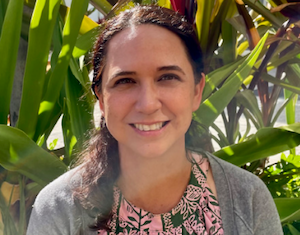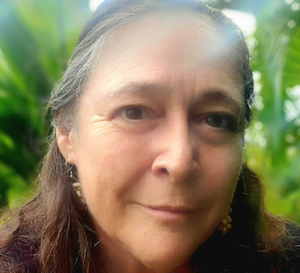Stories From Three Native Hawaiian Alaka’i About the Education of Young Children
by Charis-Ann Sole, M. Nālani Mattox-Primacio, and Shin Ae Han
‘A‘ohe pau ka ‘ike i ka hālau ho‘okahi. #203
All knowledge is not taught in the same school.
[One can learn from many sources.]
There is waiwai (value) from all resources, and not all knowledge is the same.
(Pukui, 1983, p. 24)
Ho’olauna–To Introduce
Many Indigenous parents want their children to learn who they are, to know their relatives, to know about their ancestors who have passed on, to learn their Indigenous language(s), to know about the land they are from, and to develop a spiritual identity rooted in their Indigenous identity (Ball, 2012). Historically, educational systems in the United States have taken on the function of educating children separated from native knowledge. Instead, schools are still used to culturally assimilate, naturalize, and expand the Western mindset rather than to teach for success that includes ancestral language, traditions, practices, and cultural value systems (Kana‘iaupuni et al., 2017). As this practice of erasure continues today, it confuses and contradicts what children know and learn to be true in their daily lives outside of school settings (Goodyear-Ka‘ōpua et al., 2008).
The inherent right to their cultural identity, language, and values is one of children’s fundamental human rights (Battiste, 2013; United Nations General Assembly, 2007). Some in the early childhood field are accordingly exploring ways to shape programs that reflect the unique cultural knowledge and values of Indigenous populations (Smith-Gilman, 2015). Indigenous education aims to build on and enhance the linguistic, cultural, and cognitive strengths held within the native host culture, often by including efforts to revitalize languages, knowledge, practices, and beliefs lost through colonization or occupation (Demmert & Towner, 2003), and seeks to make learning more meaningful and relevant to students. Essential to this (re)education model is the integration of elders, families, and communities into everyday educational settings, which may lead to a more “holistic, community-oriented system” (Bang et al., 2019, p.15).
Recognizing the fundamental importance of preserving cultural identity and values, early childhood education (ECE) is gradually embracing Indigenous practices and ways of living (Lees & Bang, 2023). The approach of centering indigenous culture and language is accentuated as an integral part of ECE practices in Hawai‘i (Kaomea, 2005). In this endeavor, early childhood educators in Hawai‘i strive to honor indigenous traditions and heritage and seek to create an environment where young children develop while forging a strong connection to their indigenous roots. This commitment to Indigenous education in ECE settings aligns with broader efforts to revitalize languages, knowledge, and practices that have been lost, to foster a return that involves elders, families, and community voices in the educational journey of the younger generation.
 Charis-Ann Sole, a part Native Hawaiian, has been an early childhood educator in O‘ahu, Hawai‘i for the past 17 years. She holds an MS in Child Development from Erikson Institute and an MEd in Early Childhood Education from the University of Hawai‘i at Mānoa. Her interests center on re-imagining education systems for Indigenous students, partnering with communities, connecting students to their kupuna, as well discovering her own connection to her people that came before.
Charis-Ann Sole, a part Native Hawaiian, has been an early childhood educator in O‘ahu, Hawai‘i for the past 17 years. She holds an MS in Child Development from Erikson Institute and an MEd in Early Childhood Education from the University of Hawai‘i at Mānoa. Her interests center on re-imagining education systems for Indigenous students, partnering with communities, connecting students to their kupuna, as well discovering her own connection to her people that came before.
 M. Nālani Mattox-Primacio, a Native Hawaiian, has 35 years of experience managing, developing, and administering grants for Native Hawaiian-serving early childhood programs. Nālani was a special projects manager at a Native Hawaiian family learning center across three islands and also held multiple management and training positions in Indigenous accreditation (WINHEC), home-visiting, preschool, and family and child interaction learning (FCIL) programs in Hawaii. She is an alumnus of and adjunct faculty member of the University of Hawai‘i system in Honolulu, O‘ahu Island.
M. Nālani Mattox-Primacio, a Native Hawaiian, has 35 years of experience managing, developing, and administering grants for Native Hawaiian-serving early childhood programs. Nālani was a special projects manager at a Native Hawaiian family learning center across three islands and also held multiple management and training positions in Indigenous accreditation (WINHEC), home-visiting, preschool, and family and child interaction learning (FCIL) programs in Hawaii. She is an alumnus of and adjunct faculty member of the University of Hawai‘i system in Honolulu, O‘ahu Island.
 Shin Ae Han is an assistant professor and cohort coordinator in the School of Teacher Education at the University of Hawai‘i at Mānoa. Her work is centered on early childhood education with a focus on program development and implementation of culturally responsive/sustaining pedagogy, project-based learning, and place-based education. She actively collaborates with local communities and schools in Hawai’i on various early childhood projects and teacher preparation programs.
Shin Ae Han is an assistant professor and cohort coordinator in the School of Teacher Education at the University of Hawai‘i at Mānoa. Her work is centered on early childhood education with a focus on program development and implementation of culturally responsive/sustaining pedagogy, project-based learning, and place-based education. She actively collaborates with local communities and schools in Hawai’i on various early childhood projects and teacher preparation programs.